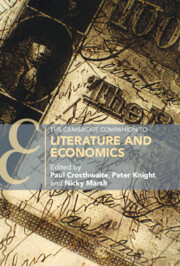Book contents
- The Cambridge Companion to Literature and Economics
- The Cambridge Companion to Literature and Economics
- Copyright page
- Contents
- Contributors
- Introduction
- Part I Histories and Critical Traditions
- Part II Contemporary Critical Perspectives
- Part III Interdisciplinary Exchanges
- Chapter 15 The Keynesian Theory of Jamesonian Utopia: Interdisciplinarity in Economics
- Chapter 16 Reading beyond Behavioral Economics
- Chapter 17 Fictional Expectations and Imagination in Economics
- Further Reading
- Index
- Cambridge Companions To …
Chapter 17 - Fictional Expectations and Imagination in Economics
from Part III - Interdisciplinary Exchanges
Published online by Cambridge University Press: 28 July 2022
- The Cambridge Companion to Literature and Economics
- The Cambridge Companion to Literature and Economics
- Copyright page
- Contents
- Contributors
- Introduction
- Part I Histories and Critical Traditions
- Part II Contemporary Critical Perspectives
- Part III Interdisciplinary Exchanges
- Chapter 15 The Keynesian Theory of Jamesonian Utopia: Interdisciplinarity in Economics
- Chapter 16 Reading beyond Behavioral Economics
- Chapter 17 Fictional Expectations and Imagination in Economics
- Further Reading
- Index
- Cambridge Companions To …
Summary
This chapter examines the role of imagination in enabling economic actors to make sense of the world and decide how to act and the part played by metaphorical thinking and analytical imagination within the discipline of economics. It starts from the assumption that modern capitalism is a quintessentially creative and imaginative system, characterized by constant novelty and radical uncertainty. The authors argue that economic behavior is therefore necessarily guided by working fictions and, in particular, by fictional expectations that combine individual imaginaries and social narratives with calculation. Building on insights from literary theory, the chapter examines the structuring and performative role of narratives and models and concludes that market power rests with those able to make their narratives and imaginaries count. Championing a new form of narrative economics, the authors propose that economists should employ discourse analysis to read the contingent interpretations that economic actors use to navigate uncertain futures.
Keywords
- Type
- Chapter
- Information
- The Cambridge Companion to Literature and Economics , pp. 277 - 292Publisher: Cambridge University PressPrint publication year: 2022
- 1
- Cited by

